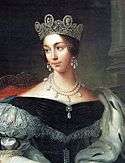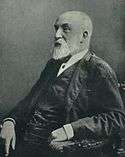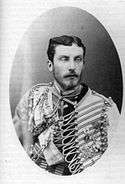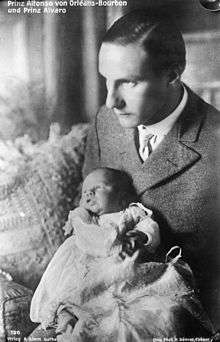Duke of Galliera
.svg.png)
The Dukedom of Galliera was an Italian noble title created in 1812 by Emperor Napoleon I of France for Josephine of Leuchtenberg, daughter of Eugène de Beauharnais and granddaughter of Napoleon's first wife Josephine, which she kept even after her marriage with Oscar, Crown Prince of Sweden. The name refers to the comune of Galliera, located in the Province of Bologna in Emilia–Romagna. Napoleon had already given her the Palazzo Caprara in Bologna in 1807, which was renamed the Palazzo Galliera.
In 1837, after a decade of negotiations, Prince Oscar sold properties attached to the dukedom to Marquis Raffaele de Ferrari of Genoa. The following year, he received the title of Duke of Galliera from Pope Gregory XVI. In 1839, King Charles Albert of Sardinia confirmed the grant to the marquis and added the title of Prince of Lucedio.
With his wife, Maria Brignole-Sale, the new Duke of Galliera had three children, but two of them died young and childless. The third, the famous philatelist Philipp von Ferrary, renounced the title and inheritance to which it was linked.
In 1877, after the death of her husband, Maria Brignole-Sale, fervent Orléanist, bequeathed his Italian properties to the Duke of Montpensier, youngest son of Louis-Philippe I, King of the French. After the death of the duchess in 1888 the prince received from King Umberto I of Italy the ducal title. From then, the title Duke of Galliera has belonged to the Orleans branch of the Spanish Royal Family, although the properties attached to the dukedom were sold by the 4th Duke in 1920.
Bernadotte-Leuchtenberg dukes
| Name | Portrait | Birth | Marriages | Death |
|---|---|---|---|---|
| Josephine 1812–1837 |
 |
14 March 1807 Milan eldest daughter of Eugène de Beauharnais and Princess Augusta of Bavaria |
19 June 1823 Stockholm five children |
7 June 1876 Stockholm aged 69 |
| Oscar 1823–1837 |
 |
4 July 1799 Paris only son of Charles XIV John of Sweden and Désirée Clary |
8 July 1859 Stockholm aged 60 | |
Ferrari Brignole-Sale dukes
| Name | Portrait | Birth | Marriages | Death |
|---|---|---|---|---|
| Raffaele de Ferrari 1838–1876 |
Image | 6 July 1803 Genoa son of Andrea de Ferrari and Livia Ignazia Pallavicino |
c. 1828 three children |
23 November 1876 Genoa aged 73 |
| Maria de Brignole-Sale 1876–1888 |
 |
5 April 1811 Genoa daughter of Antoine Brignole-Sale, Marchese di Groppoli and Arthemisa Negrone de Gênes |
9 December 1888 Genoa aged 76 | |
Orléans dukes
| Name | Portrait | Birth | Marriages | Death |
|---|---|---|---|---|
| Prince Antoine 1888–1890 |
 |
31 July 1824 Château de Neuilly, Neuilly-sur-Seine fifth son of Louis-Philippe of France and Maria Amalia of Naples and Sicily |
Infanta Luisa Fernanda of Spain 10 October 1846 Madrid ten children |
4 February 1890 Palacio de Orleans-Borbón, Sanlúcar de Barrameda aged 65 |
| Infante Antonio 1890–1930 |
 |
23 February 1866 Seville only surviving son of Antoine and Infanta Luisa Fernanda of Spain |
Infanta Eulalia of Spain 6 March 1886 Madrid three children |
24 December 1930 Paris aged 64 |
| Infante Alfonso 1930–1975 |
 |
12 November 1886 Madrid eldest son of Antonio and Infanta Eulalia of Spain |
Princess Beatrice of Saxe-Coburg and Gotha 15 July 1909 St. Augustine's Church, Coburg three children |
6 August 1975 Sanlúcar de Barrameda aged 88 |
| Infante Alvaro 1975–1997 |
20 April 1910 Coburg eldest son of Alfonso and Princess Beatrice of Saxe-Coburg and Gotha |
Carla Parodi-Delfino 10 July 1937 Rome four children |
22 August 1997 Monte Carlo aged 87 | |
| Don Alfonso 1997–present |
.svg.png) |
5 January 1968 Santa Cruz de Tenerife eldest son of Don Alonso de Orléans-Borbón y Parodi Delfino and Emilia Ferrara-Pignatelli |
Véronique Goeders 28 March 1994 Paris one son |
living |
See also
Notes and references
- History of the Duchy of Galliera.
- Dominique Paoli, Fortunes and Misfortunes of the Princes of Orleans, 1848-1918, Artena, 2006, p. 248. 248.
- Duke of Galliera Escapes. Appears in Italy from Madrid, where King was his Guardian. The New York Times. September 12 1919.
- Franco Ardizzoni, 'Il Ducato di Galliera, Dalle terre della "bassa" all'Europa'
